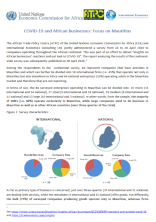COVID-19 and African businesses: Focus on Mauritius

The African Trade Policy Centre (ATPC) of the United Nations Economic Commission for Africa (ECA) and International Economics Consulting Ltd., jointly carried out the first comprehensive survey on the COVID-19 pandemic and its economic impacts across Africa in mid-April. The results and findings of the survey for Africa were published here (https://www.uneca.org/sites/default/files/PublicationFiles/eca-iec_survey_covid-19_africa_english_final.pdf).
With a view to provide further insights to the Mauritian sector, we are publishing a second report, with an emphasis on businesses operating in Mauritius. Among the respondents to the continental-wide survey, 84 were from firms having their operations in Mauritius, either at national or international level. The results have highlighted the major challenges that firms are facing due to the current crisis.
Most companies not operating outside of Mauritius expected a drop in demand for products and services, whereas companies operating in Mauritius and in other African countries expressed their concerns about having difficulties in having an operational cash flow. While a shortage in supplies are affecting all companies, micro enterprises are fearing the worst, going as far as business closure.
The survey also finds that most Mauritian based companies have turned to commercial banks to improve their working capital. Although companies that trade have a higher success rate as compared to their local counterparts. The public sector is seen as the sole other port of call for liquidity for firms operating only on the Mauritian market.
Generally, Mauritian firms seem relatively satisfied with the responses offered by the government to the crisis, although they would like to see a postponement in tax payments and wage subsidisation.
The silver lining in this crisis situation is that Mauritian businesses seem to be prepared for extreme situations. While companies engaged in exports are adapting themselves by developing new strategy and products, companies in Mauritius alone have been working remotely. With a view to provide business continuity, this unique situation has forced companies to adopt new technologies.